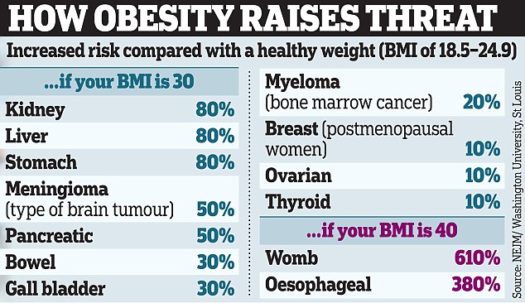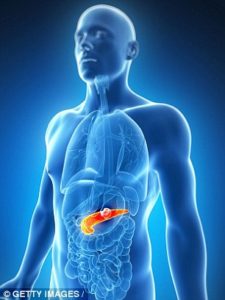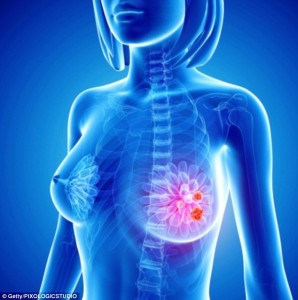Scientists link obesity to THIRTEEN types of disease including the ovaries, stomach and liver, being overweight or obese, nearly tripling the list from five to 13.

Excess weight increases the risk of stomach, liver, ovary, gall bladder, pancreas, thyroid, blood cancer and a type of brain tumour, researchers from Washington University found
The study, by World Health Organisation scientists, suggests the number of people who get the disease because of an unhealthy lifestyle is thousands higher than previously thought.
Until now, doctors believed only five cancers were linked to excess weight – breast, womb, bowel, kidney and oesophageal.
But a review of evidence, analysed by the WHO International Agency for Research on Cancer, adds eight to the list – ovarian, stomach, liver, pancreatic, gall bladder, thyroid, the bone marrow cancer myeloma, and a type of brain tumour called meningioma.
Experts warned that Britain’s obesity crisis may mean cancer rates increase at a higher rate than estimated.
They urged the Government, which came under severe criticism for its ‘watered down’ Childhood Obesity Strategy last week, to take the problem far more seriously.
Ministers were accused of caving in to pressure from the junk food industry, after they scrapped plans to ban TV adverts for unhealthy food and get rid of cartoon characters on children’s food packaging.
The strategy was missing a proposed ban on trans-fats and had no concrete rules to force manufacturers to reduce sugar in food – instead relying on voluntary agreements.
 Twenty years ago scientists began to realise that poor diets and sedentary lifestyles may be linked to some types of cancer.
Twenty years ago scientists began to realise that poor diets and sedentary lifestyles may be linked to some types of cancer.
They found that having more fat in the body changes the balance of hormones such as oestrogen, testosterone and insulin – which can each drive tumour growth.
In 2002 the IARC produced a list of five cancers which were more likely to occur if someone was overweight.
The same group of scientists – led by experts at Washington University School of Medicine in St Louis – released the extended list of 13. Cancer Research UK has estimated that 18,000 cases of cancers in Britain every year are caused by excess weight, making obesity the biggest preventable cause of the disease after smoking.

Experts say a healthy diet, exercising and not smoking, can have a significant impact on reducing cancer risk
But the latest findings mean that number will be far higher.
Study leader Dr Graham Colditz, of Washington University, said: ‘The burden of cancer due to being overweight or obese is more extensive than what has been assumed.
‘Many of the newly identified cancers linked to excess weight haven’t been on people’s radar screens as having a weight component.’
 Excess fat leads to an overproduction of estrogen, testosterone and insulin, which can drive cancer growth in the pancreas (pictured) and other areas
Excess fat leads to an overproduction of estrogen, testosterone and insulin, which can drive cancer growth in the pancreas (pictured) and other areas
In the past, doctors stressed that cancer was down to genetics, and a diagnosis was simply ‘bad luck’. But in recent years, experts have emphasised that the risk could be reduced with a healthy lifestyle.
They estimate that roughly 40 per cent of cancer cases may be avoidable – compared with 85 to 90 per cent of heart disease cases.
Dr Colditz, whose findings were published in the New England Journal of Medicine, said: ‘Lifestyle factors such as eating a healthy diet, maintaining a healthy weight and exercising, in addition to not smoking, can have a significant impact on reducing cancer risk.
‘Public health efforts to combat cancer should focus on these things that people have some control over. This is another wake-up call. It’s time to take our health and our diets seriously.’ The findings were based on more than 1,000 studies of weight and cancer risk.
Combining the results, scientists calculated that obesity – having a body mass index of more than 30 – raises the risk of pancreatic cancer by 50 per cent. For bowel cancer, the risk rises 30 per cent, and for ovarian cancer by 10 per cent.
Obese people are 80 per cent more likely to get liver cancer than those of a healthy weight, and nearly 400 per cent more likely to get oesophageal cancer if their BMI is 40 or above.

For breast cancer, for example, the risk goes up by an additional 10 per cent for every five BMI points above 30
They found that for most forms of the disease, the risk rises as a person gets heavier, proving there is a direct link. For breast cancer, for example, the risk goes up by an additional 10 percentage points for every five BMI points above 30.
Cancer Research UK’s Dr Jyotsna Vohra said: ‘This report adds to the overwhelming evidence that carrying too much weight increases the risk of cancer … Yet last week the Government failed to take obesity seriously … Unless the Government acts, future generations will face ill-health, will develop cancers that could have been avoided and a financially overwhelmed NHS will be unable to cope.’
Written by Ben Spencer, Medical Correspondent for The Daily Mail ~ August 25, 2016.
FAIR USE NOTICE: This site contains copyrighted material the use of which has not always been specifically authorized by the copyright owner. We are making such material available in our efforts to advance understanding of environmental, political, human rights, economic, democracy, scientific, and social justice issues, etc. We believe this constitutes a ‘fair use’ of any such copyrighted material as provided for in section 107 of the US Copyright Law. In accordance with Title 17 U. S. C. Section 107, the material on this site is distributed without profit to those who have expressed a prior interest in receiving the included information for research and educational purposes. For more information go to: http://www.law.cornell.edu/uscode/17/107.shtml“
